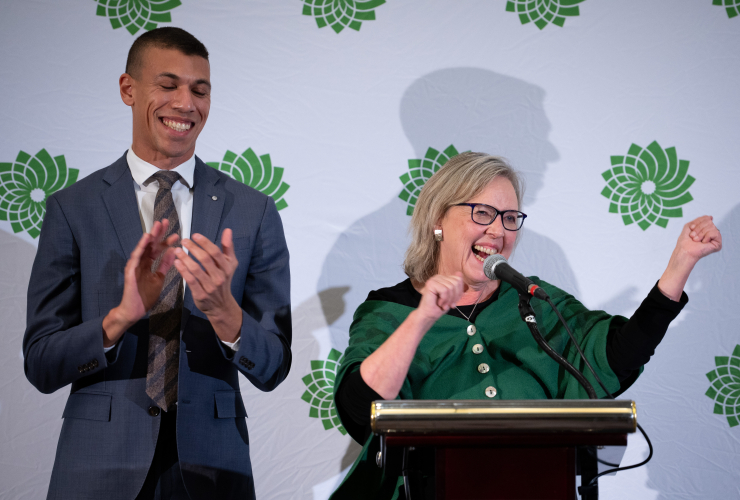The 2019 election in Prince Edward Island drew attention from across the country and around the world. The Green Party of P.E.I. won an astonishing eight of the provincial legislature’s 27 seats and formed the official Opposition. This was the first jurisdiction in North America that now had a Green Opposition.
Clearly, the Green Party was on the rise. But four years later, the Greens were reduced to third party status, winning just two seats in the 2023 election. Green Leader Peter Bevan-Baker won his seat, but by just 106 votes. The Green Party’s popular vote sank to just 22 per cent.
What happened? Does the 2023 results mean the Greens were just a flash in the pan? Will the party go the way of other upstart parties in Canada that quickly rise and just as quickly sink, never to be heard from again?
No. The 2023 results, while profoundly disappointing for the Greens, actually reveal the party still has a solid base and should have a bright future in P.E.I. The trick will be for the party not to panic, nor to descend into finger-pointing and blame-gaming. The Greens need to take a step back and dispassionately analyze what happened.
They should start with the most obvious reason for the setback. Both the Greens and the Liberals were steamrolled by an early election call, a PC juggernaut and a popular premier widely praised for how he handled the pandemic.
The PCs’ ground game in 2023 was also superb. The party did such a good job of getting the vote out that the PCs would have won 17 seats and a majority if only the party’s advance polls’ results were counted. In other words, the PCs would have still won the election if not a single PC voter showed up on election day.
Such exaggerated results are not uncommon on P.E.I., which often sees huge wins and spectacular defeats. Indeed, twice in the past 40 years, both the PCs and the Liberals have been left with just one seat. So the Greens’ drop from eight to two seats is not remarkable. Remember, the Liberals went from 18 seats in 2015 to just six in 2019 and won only three in 2023.
But the other reason is more complicated, and it has to do with what really happened in 2019— the election in which the Greens shocked the country.
In 2019, the PCs won 13 seats and formed the island’s first minority government. This was after three consecutive wins by the Liberals. But the PCs polled 249 fewer votes in 2019 than it had in 2015 when the party won just eight seats. The PC victory in 2019 had much to do with disaffected Liberals parking their votes with the Greens and causing vote splits.
Going into the 2019 campaign, the Greens knew the Liberals were vulnerable. The Greens also recognized their party’s core values of conservation and environmentalism had given fodder to their opponents, who repeatedly accused them of being anti-farmer and anti-rural.
So in 2019, the Greens instead presented a comprehensive platform that focused on such pressing concerns as health care and housing. The platform spoke of working with farmers and rural communities to ensure “resilience” and “sustainable agricultural practices.”
The tactic worked. The Greens deservedly formed the official Opposition. But the point here is the increase in seats for the Greens in 2019 was not so much an indication of the “greening” of P.E.I. as it was the result of the party providing a credible and moderate alternative to a Liberal government that had passed its best-before date. Therefore, the apparent move away from the Greens in 2023 was not a rejection of once-embraced core Green values because those core Green values were never fully embraced in the first place.
The Greens would do well to compare the party’s 2023 fortunes, not with 2019, but with 2015. In 2015, the party won just 8,850 votes. In 2023, it received almost twice that, and that was in an election with a record-low turnout.
Another way of measuring the resilience of the Greens is to look at their second-place finishes. In 2015, the Greens won a single seat, but Green candidates finished second in none. In 2019, the Greens won eight seats and finished second in another 11. In 2023, the Greens won two seats but finished second in 18. This means the party has established a strong base across the province, including in rural P.E.I. This is slow growth, but it is resilient and sustainable.
The Green Party of Prince Edward Island is smarting from its loss of seats. But if the party can keep its cool, it has an excellent opportunity to build on this base for future elections.
Don Desserud is a political scientist and political analyst living on Prince Edward Island. He has a BA and MA from Dalhousie University, an MA from the University of New Brunswick, and a PhD from Western University. His research focuses on Maritime provincial elections and politics. He also studies parliamentary institutions.






Comments